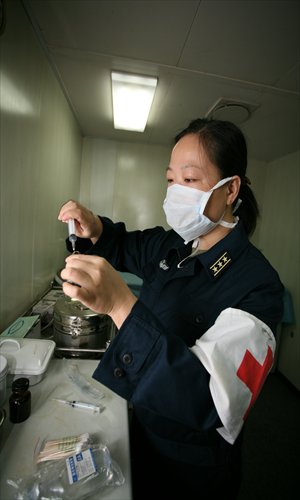Warrior women

At roughly 10 am on February 17, 2013, the fleet undertaking the 14th escort mission since 2009 entered the waters of the East China Sea.
On the bridge of the Harbin, Xie Weiwei, one of the eight female sailors in the fleet, carried her combat readiness pack and gripped the steering wheel as the sailor on duty.
It was the first time female crew had formally been allowed to occupy combat roles during navy escort missions, and fight side by side with men.
Since December 2008, female sailors in China have had non-combat roles in escort missions in the Gulf of Aden. They worked in a variety of roles such as medical officers, translators and service coordinators.
As female soldiers continue to break social barriers and work in critical military positions around the world, female Chinese sailors, for the first time, were given the opportunity to face up to the challenges and pressures that previously fell solely upon men.
Making the grade
It was June 2010, when the Chinese navy first decided to launch a pilot program to enlist female crew for combat positions.
By September 2010, the East China Sea Fleet had finalized application procedures involving physical tests, written exams, interviews and thorough background checks. They chose 14 qualified female sailors out of hundreds of applicants and assigned training in various roles such as steering and radar.
On November 2, these 14 female crew embarked on their first mission - in an unofficial practice run - as the fleet for the 7th escort mission left Zhoushan harbor.
They were divided into seven groups to shift through different positions and were assigned mentors and tutors for each position.
"I worked at different positions in that fleet and the most impressive one was on the bridge where I was taught to steer the vessel," Yu Haomiao, one of the 14 female crew, told the Global Times. "This pilot program may help train the first female fleet captain in China's history."
For many of these female sailors, joining that mission didn't mean they became qualified members of the fleet. To be able to serve independently on duty, they had to pass extra theoretical and operational tests.
Zhang Yan, the first female sailor to earn the honor of serving independently on duty in the fleet, gained respect from her male counterparts by working extra hours after the class.
Zhang became the first female rigging sailor in Chinese navy.
By March 2011, all 14 female sailors had passed the exams and started to serve independent shifts in different roles.
Their own niche
Before entering combat positions, female sailors were only allowed to work in the fields of medicine, communications or hospitality.
Wang Haiwen, one of the female crew who served in the fleet for the 4th escort mission in the Gulf of Aden, told the Global Times that the presence of female sailors in the past was only to boost morale.
"From the traditional point of view, women should only be allowed to serve in non-critical positions, such as hosting events or caring for the sick. But in reality, women have shouldered unimaginable tasks and it would have been impossible for male sailors to replace them," Wang said.
Wang's opinion was echoed by Xie Wenjuan, a female navy doctor, who told the Global Times that she usually served as the "shrink" on the ship.
"Many young naval sailors and officers called me 'grandma' and would trust me with their stories," Xie said.
One of the soldiers burned his hands and face with boiling hot porridge and was worried about scars preventing him from finding a girlfriend in the future. He felt relatively relieved after talking to Xie, she said.
"Soldiers serving long term in the sea usually build up a lot of pressure," said a navy official from the East China Sea Fleet. "They are more likely to confide in female co-workers than male ones. In some ways, these female crew are 'angels' that help 'heal' the fleet."
A different kind of battle
All over the world, there has always been debate on whether females should be allowed to fight in battles or serve in critical war-time positions.
"The first time I boarded the ship, I was curious about everything," Xiang Jiaorong, a 29-year-old female sailor, told the Global Times, adding that the notion that she had to be extra tough didn't really enter her mind until the ship encountered winds of up to 100 kilometers per hour and powerful waves on the way to the Gulf of Aden.
Xiang and the other female crew encouraged each other to stay strong and to fight their feelings of nausea. As they stayed at their posts during the storm, other male sailors' spirits were boosted since they didn't want to look weak in front of their female counterparts.
"The key factor in terms of accepting female crew members is breaking the barriers of traditional ideas," an anonymous high-ranking navy officer told the Global Times. "This barrier exists universally in navy forces around the globe. In recent years, female sailors' performances in escort missions have gradually changed people's way of thinking. This may help expand our recruit procedure to allow female soldiers to participate in more combat missions in the future."
Shortly before China officially assigned women to combat positions in escort missions, the US revoked a ban on female soldiers serving in combat roles on January 24, 2013.
At the press conference, former US defense secretary Leon Panetta said he wanted to remove as many barriers as possible for talented and qualified people to be able to serve in military.
"Women are already contributing in unprecedented ways to the mission…they have become an integral part of our ability to perform our mission," Panetta said.